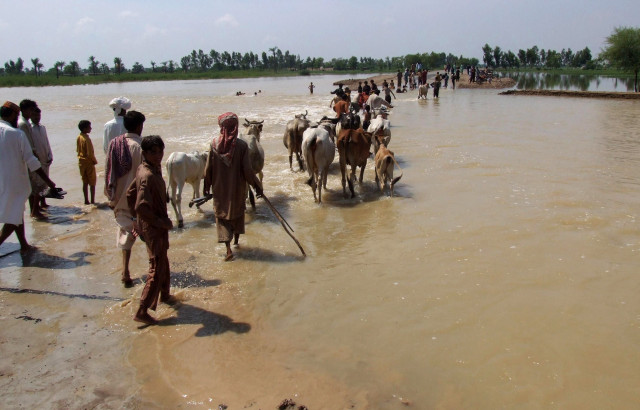‘Govt’s poor relief measures more devastating than natural disasters’
Attitude of feudal lords disappoints participants of meeting

These views were shared by the participants of a meeting organised by the Peoples Accountability Commission on ‘Post Flood Issues’, in collaboration with Participatory Development Initiatives and Oxfam Novib on Thursday. Representatives of NGOs, human rights activists, journalists and intellectuals discussed the various issues and challenges faced by flood-affected people in various parts of Sindh and Balochistan.
“Sindh suffers not from natural calamities, but from manmade disasters and that has caused the people to suffer,” said Punhial Saryo of the Sindh Harri Sangat. He added that the current government did not take any responsibility for the negligence shown by its policy makers and many flood victims have still not been properly rehabilitated.
“The objective of ‘certain’ decision makers was to cut Tori Bund in order to save their own properties, while the flow of the flood water could be diverted towards the desert area,” he said, adding that during the recent rains, an influential minister from Shahdadkot made artificial cuts and routes to save his land and created protection embankments that caused devastation in Sindh.

“People suffered because of blockades made on natural water courses by influential people and no viable policy by the Sindh government was there to eliminate them,” said a human rights activist Ashothama. He added that it was the responsibility of the state to protect the lives and property of those affected by the floods, but there were gaps in the policies and their implementation. “There is an urgent need of lobbying among lawmakers and government officials so that they can implement laws in letter and spirit to save the lives of the people.”
Commenting on the conditions of those who were lucky enough to live in refugee camps, advocate Sobia Talpur said that poor vulnerable women in these camps have become subject to sexual harassment. These crimes have been reported to the government but it has failed to take any action to protect them.
Prof. Ismail Kumbhar from the Tando Jam Agriculture University said that the majority of the rural population in the province depended on agriculture, but has suffered because of the floods. “Only influential feudal lords have benefited from announced agriculture packages whereas small and middle land owners are deprived of them,” said Kumbhar. He added that ‘bigwigs’ in Badin distributed buffaloes among their coteries but not to those flood affected people, which proved how inhumane and selfish they really are.
Published in The Express Tribune, November 24th, 2012.



















COMMENTS
Comments are moderated and generally will be posted if they are on-topic and not abusive.
For more information, please see our Comments FAQ